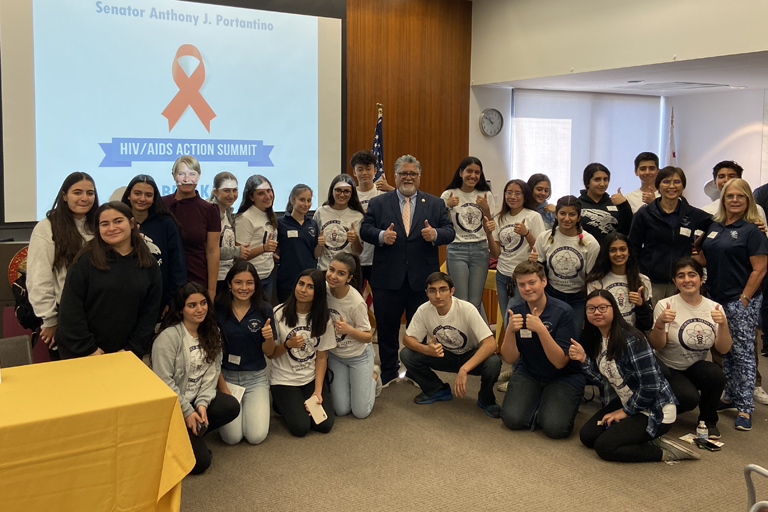By Mary O’KEEFE
The 11th Annual San Gabriel Valley HIV/AIDS Action Summit was recently held at USC Verdugo Hills Hospital. The purpose of the summit was to promote Public Health Policy Advocacy and to provide a global update on the disease.
State Senator Anthony Portantino sponsored the summit, which brought together medical professionals who could speak to the cause, treatment and future discoveries of HIV/AIDS.
Local high schools, including Glendale, La Cañada and Crescenta Valley, were in attendance along with students from several other schools. The students all had one thing in common – they were students in their school’s academy of medical science.
It was the first time CVHS students from the Academy of Science and Medicine attended the event.
“I didn’t know that AIDS was the end stages of HIV. I thought it was similar but separate,” said Lori Mehdikhani, a 10th grade student who attended the summit.
Unlike some other viruses, the body cannot completely rid itself of HIV (human immunodeficiency virus). It is a virus that attacks the CD4 cells, or T cells. These cells are the human body’s first defense against illness. HIV attacks the immune system by reducing the number of CD4 cells. AIDS (acquired immunodeficiency syndrome) is the most severe phase of an HIV infection.
Tatyana Chorbajian, another 10th grader, had the same view of HIV/AIDS.
“I actually thought [HIV and AIDS] were the same virus but two different terms,” she said. “If you have AIDS there’s no way to come back.”
Eliza Pambukhchyan, another 10th grade student, added that she learned at the summit about the treatments and preventive medication now available.
“What I know now is that this medication, called PrEP, can be used [to protect] the T4 cells,” she said. “What it can do is decrease the [likelihood] of a [person] getting HIV from sexual contact by 99%.”
PrEP (pre-exposure prophylaxis) is a prevention medication in which an HIV negative person can take a pill once a day before coming into contact with an HIV-infected person to reduce the risk of infection. PrEP must be taken for at least seven days to reach the levels that will protect the non-infected person from the virus. PEP (post-exposure prophylaxis) is a medication that people who have been exposed to HIV can take to reduce their risk. PEP must be started within 72 hours after HIV exposure. Studies have shown that PrEP reduces the risk of getting HIV from sex by 99% when taken daily. Among people who inject drugs, PrEP reduces the risk by about 74% when taken daily.
The discussion at the summit covered how the virus attacks the human immune system, the advancement in treatment and prevention and the stigma attached to those who have been HIV infected.
“One thing that stood out to me was how [HIV/AIDS] affected society’s view of how [those infected] are mainly seen in a negative way,” said Ania Konarki, 10th grader.
The students interviewed for this article expressed their concerns about how those infected with HIV/AIDS are treated, and the misunderstandings – many that are rooted in the fears and misconception of decades past – of how the virus is transmitted and who gets HIV/AIDS
“It’s critical that everyone around the world be aware and informed. Knowledge is the key and very valuable for us students,” said Lauren Karakas. Karakas added panelist Dr. Dorian said that social media is “everything.”
She said using that platform to spread awareness of the facts would be one way that students could make a difference.
Dr. Armand Dorian, chief medical officer at USC-VHH, was part of a panel discussion at the summit.
“I completely agree,” Konarki said. “As teenagers we are [familiar] with the social media platform.”
The students felt they could use the knowledge gained at the summit to help others understand what HIV/AIDS is and create safe environments for others who may be infected.
“Knowledge is key,” Karakas added.
But with knowledge comes responsibility, including getting tested.
“I didn’t know how much of an impact testing has,” said student Dalita Tahmassian, “even if just one person gets tested.”
She added she was impressed by the research into HIV/AIDS and what medical science has been able to find concerning the spread and preventive medications.
“AIDS no longer means a death [sentence],” she said.

